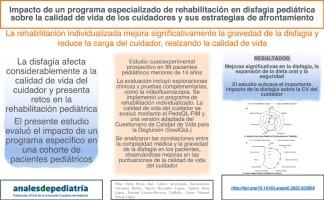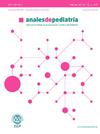Impacto de un programa especializado de rehabilitación en disfagia pediátrica sobre la calidad de vida de los cuidadores y sus estrategias de afrontamiento
IF 2.1
4区 医学
Q2 PEDIATRICS
引用次数: 0
Abstract
Introduction
We conducted a prospective quasi-experimental study with the aim of assessing the perceived quality of life (QoL) and burden of caregivers of pediatric patients with dysphagia undergoing a specific assessment and treatment program.
Material and methods
The study included pediatric patients aged less than 14 years with a diagnosis of dysphagia managed in a specialized unit. Patients underwent clinical assessments, including an oral motor assessment and diagnostic tests such as videofluoroscopy. Individualized rehabilitative treatment was initiated, including dietary modifications and rehabilitation approaches. Quality of life was evaluated by means of validated tools, including the Pediatric Quality of Life Inventory-Family Impact Module (PedsQL-FIM) and an adapted version of the Swallowing Quality of Life Questionnaire (SwalQOL).
Results
A total of 117 patients were recruited initially, and the final analysis included 99 patients. We observed significant improvements in dysphagia severity, oral diet expansion and safety outcomes after treatment. Caregivers of patients with greater neurological impairment, particularly those with GMFCS IV-V and using feeding tubes, were more likely to have higher post-intervention PedsQL-FIM scores.
Conclusions
Our findings underscore the significant impact of dysphagia on caregiver QoL and the effectiveness of individualized rehabilitation programs in improving patient outcomes and mitigating caregiver burden. Future research should focus on refining assessment tools and enhancing comprehensive care approaches to further support caregivers and patients in managing dysphagia.

儿童咽喉炎专科康复方案对照护者的生活质量及其应对策略的影响
我们进行了一项前瞻性准实验研究,目的是评估接受特定评估和治疗方案的儿科吞咽困难患者的感知生活质量(QoL)和照顾者的负担。材料和方法本研究纳入了年龄小于14岁且在专科医院诊断为吞咽困难的儿童患者。患者接受临床评估,包括口腔运动评估和诊断测试,如视频透视检查。开始进行个体化康复治疗,包括饮食调整和康复方法。生活质量通过经过验证的工具进行评估,包括儿科生活质量量表-家庭影响模块(PedsQL-FIM)和吞咽生活质量问卷(SwalQOL)。结果初始共纳入117例患者,最终纳入99例患者。我们观察到治疗后吞咽困难严重程度、口服饮食扩大和安全性结果的显著改善。神经功能受损严重的患者,特别是GMFCS IV-V和使用饲管的患者,其护理人员更有可能在干预后获得更高的PedsQL-FIM评分。结论我们的研究结果强调了吞咽困难对护理人员生活质量的显著影响,以及个性化康复方案在改善患者预后和减轻护理人员负担方面的有效性。未来的研究应侧重于完善评估工具和加强综合护理方法,以进一步支持护理人员和患者管理吞咽困难。
本文章由计算机程序翻译,如有差异,请以英文原文为准。
求助全文
约1分钟内获得全文
求助全文
来源期刊

Anales de pediatria
医学-小儿科
CiteScore
2.10
自引率
4.80%
发文量
155
审稿时长
44 days
期刊介绍:
La Asociación Española de Pediatría tiene como uno de sus objetivos principales la difusión de información científica rigurosa y actualizada sobre las distintas áreas de la pediatría. Anales de Pediatría es el Órgano de Expresión Científica de la Asociación y constituye el vehículo a través del cual se comunican los asociados. Publica trabajos originales sobre investigación clínica en pediatría procedentes de España y países latinoamericanos, así como artículos de revisión elaborados por los mejores profesionales de cada especialidad, las comunicaciones del congreso anual y los libros de actas de la Asociación, y guías de actuación elaboradas por las diferentes Sociedades/Secciones Especializadas integradas en la Asociación Española de Pediatría.
 求助内容:
求助内容: 应助结果提醒方式:
应助结果提醒方式:


